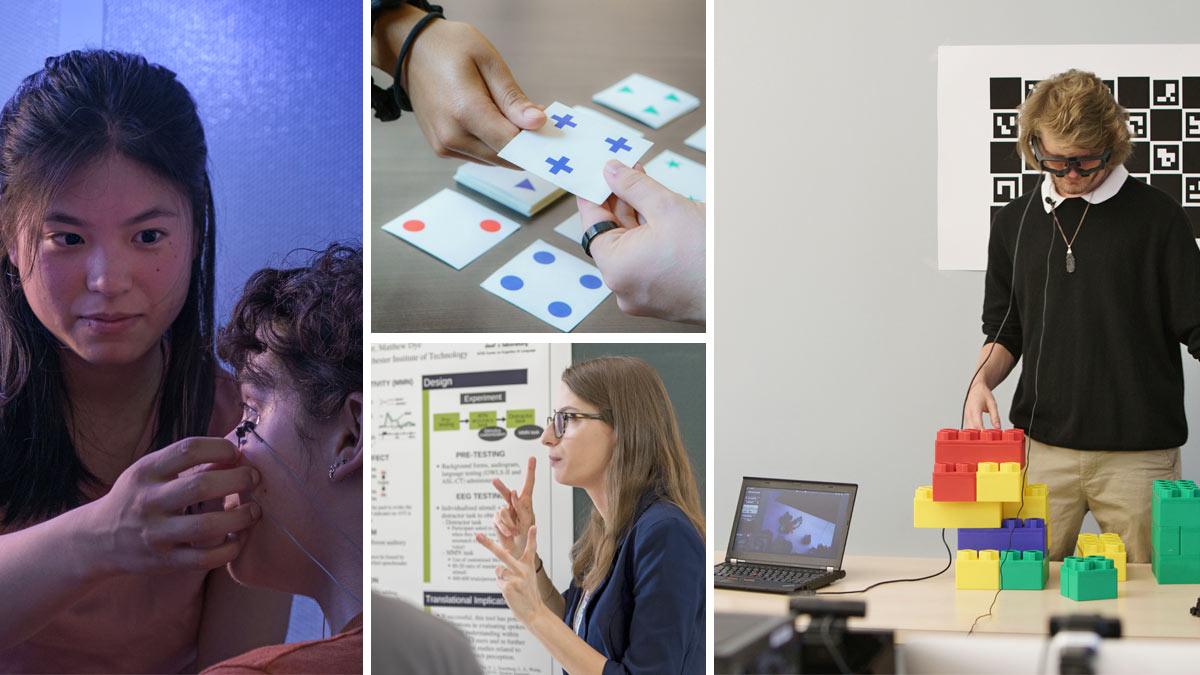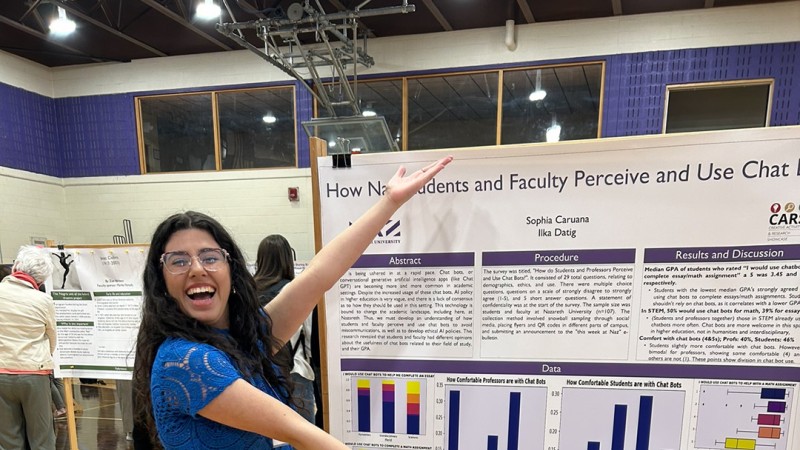Cognitive Science Doctor of Philosophy (Ph.D.) Degree

Cognitive Science
Doctor of Philosophy (Ph.D.) Degree
- RIT /
- Rochester Institute of Technology /
- Academics /
- Cognitive Science Ph.D.
Explore the human mind through psychology, neuroscience, AR, and more in RIT’s interdisciplinary Ph.D.
Overview for Cognitive Science Ph.D.
Why Pursue a Cognitive Science Ph.D. at RIT?
STEM-OPT Visa Eligible: The STEM Optional Practical Training (OPT) program allows full-time, on-campus international students on an F-1 student visa to stay and work in the U.S. for up to three years after graduation.
Cutting Edge Cognitive Science Research: Including context, culture, and cognition; biologically-inspired computational models; and cognition and human action.
Future-Focused Curriculum: Provides a dynamic program designed by academic and industry leaders to integrate formal education with state-of-the-art research and best practices from industry.
Top-Notch Faculty: Work side-by-side with experienced faculty conducting research on contemporary problems.
Students in the Ph.D. in cognitive science conduct research on human perception, cognition, action, and language with a focus on the representation and processing of information within biological and computational frameworks. Ph.D. degrees in cognitive science prepare students for careers in academia or industry and to develop abilities to analyze data, grasp complex concepts, and interpret and communicate concepts for a wider audience. Faculty advisors come from across the RIT campus to create a thriving, interdisciplinary community that supports students on their path to becoming cognitive scientists.
Interdisciplinary Curriculum for the Ph.D. in Cognitive Science
The cognitive science graduate program is jointly delivered by faculty experts from five RIT colleges, allowing students to develop valuable, career-enhancing interdisciplinary skills and communication competency as part of the program experience.
The six colleges include: College of Liberal Arts; College of Science; Golisano College of Computing and Information Sciences; Kate Gleason College of Engineering; College of Engineering Technology; and National Technical Institute for the Deaf.
-
Join us for Fall 2026
Many programs accept applications on a rolling, space-available basis.
-
Meet us on-campus on February 19
Learn about the programs that interest you. Hear from program faculty, speak with current graduate students, and ask the questions that will help you get one step closer to your career goals.
Research
Cognitive Science Research
Ph.D. in cognitive science faculty, all sharing a passion for understanding the biological and computational foundations of human cognition - including memory, perception, attention, language, learning, decision-making, creativity, and problem solving. While faculty research interests are broad, our program emphasizes:
- Context, culture, and cognition: Whilst the existence of cognitive universals is likely given the high degree of genetic overlap across animal species, there are significant variations in environments that are likely to lead to individual differences in cognition. Understanding how context and culture drive this variability can both improve our understanding of human cognition and lead to a more inclusive cognitive science.
- Biologically-inspired computational models: Computational models provide insights into the mechanisms of cognition and how information is represented and processed in cognitive systems. Biologically-inspired models not only help us constrain our cognitive theories, they also allow us to apply the insights of cognitive science to the development of innovative and powerful computational tools.
- Cognition and human action: Cognition cannot be separated from action. The purpose of cognition is to allow us to navigate the world around us in both goal-driven and stimulus-responsive ways. Therefore it is important to explain how cognition is realized in human behavior, and the role of cognition in guiding human action.
Featured Work and Profiles
-
Student Finds Her Niche in New Cognitive Science Ph.D. Program
Sophia Caruana RIT’s new cognitive science Ph.D. program is attracting students such as Sophia Caruana, who is eager to explore data ethics, AI, and human-centered computing in a collaborative, multifaceted...
Read More about Student Finds Her Niche in New Cognitive Science Ph.D. Program
Related News
-
December 3, 2025

Opening of new Research Building will position RIT at the ‘forefront of discovery’
RIT’s new Research Building officially opened its doors Dec. 2, and inside, faculty and students are gearing up to usher in a new era of discovery on campus.
-
November 6, 2025

New eye-tracking research will help understand how deaf people process vocabulary
Researchers will soon use eye-tracking to show how deafness impacts vocabulary knowledge and reading as well as how deaf and hard-of-hearing children, who have historically shown lower than average reading outcomes, develop into highly skilled readers.
-
January 23, 2025

Alm and Fitch awarded NSF grant to study visual prosody in ASL in collaboration with Gallaudet University
Linguists face a resource gap for studying visual prosody and its grammatical and emotional functions in sign languages, and for creating AI systems capable of processing visual prosody. Faculty members affiliated with RIT’s Ph.D. program in Cognitive Science aim to fill that gap through Deaf scientist-centered research.
Curriculum for 2025-2026 for Cognitive Science Ph.D.
Current Students: See Curriculum Requirements
Students are also interested in
Admissions and Financial Aid
This program is available on-campus only.
| Offered | Admit Term(s) | Application Deadline | STEM Designated |
|---|---|---|---|
| Full‑time | Fall | January 15 priority deadline; rolling thereafter | Yes |
Full-time study is 9+ semester credit hours. International students requiring a visa to study at the RIT Rochester campus must study full‑time.
Application Details
To be considered for admission to the Cognitive Science Ph.D. program, candidates must fulfill the following requirements:
- Learn tips to apply for a doctoral program and then complete a graduate application.
- Submit copies of official transcript(s) (in English) of all previously completed undergraduate and graduate course work, including any transfer credit earned.
- Hold a baccalaureate degree (or US equivalent) from an accredited university or college. Since the program encompasses a wide variety of disciplines, students with diverse backgrounds are encouraged to apply. A minimum cumulative GPA of 3.0 (or equivalent) is recommended.
- Submit a current resume or curriculum vitae.
- Submit a statement of purpose for research which will allow the Admissions Committee to learn the most about you as a prospective researcher.
- Submit two letters of recommendation.
- Entrance exam requirements: None
- Submit one writing sample. This may be an example of your research, publications, project, or other scholarly written work.
- Submit English language test scores (TOEFL, IELTS, PTE Academic, etc.), if required. Details are below.
English Language Test Scores
International applicants whose native language is not English must submit one of the following official English language test scores. Some international applicants may be considered for an English test requirement waiver.
Duolingo (DET): 130
IELTS: 6.5
LanguageCert Academic: 74
PTE Academic: 60
TOEFL: 88/4.5
International students below the minimum requirement may be considered for conditional admission. Deaf and hard-of-hearing test takers with significant hearing loss do not need to take the listening and speaking sections for the TOEFL and IELTS. Each program requires balanced sub-scores when determining an applicant’s need for additional English language courses.
How to Apply Start or Manage Your Application
Cost and Financial Aid
An RIT graduate degree is an investment with lifelong returns. Ph.D. students typically receive full tuition and an RIT Graduate Assistantship that will consist of a research assistantship (stipend) or a teaching assistantship (salary).
Accreditation
Contact
- Mandie Klingelhoffer
- Senior Assistant Director
- Office of Graduate Admissions
- Enrollment Management
- 585‑475‑5526
- mskecr@rit.edu
- Matt Dye
- Graduate Program Director, Cognitive Science
- Department of Liberal Studies
- National Technical Institute for the Deaf
- 585‑475‑2252
- mwddls@rit.edu


















